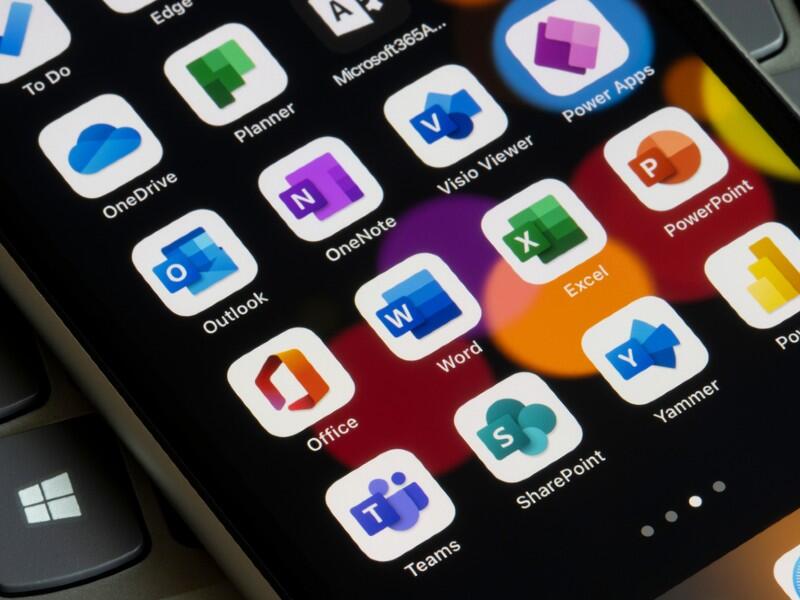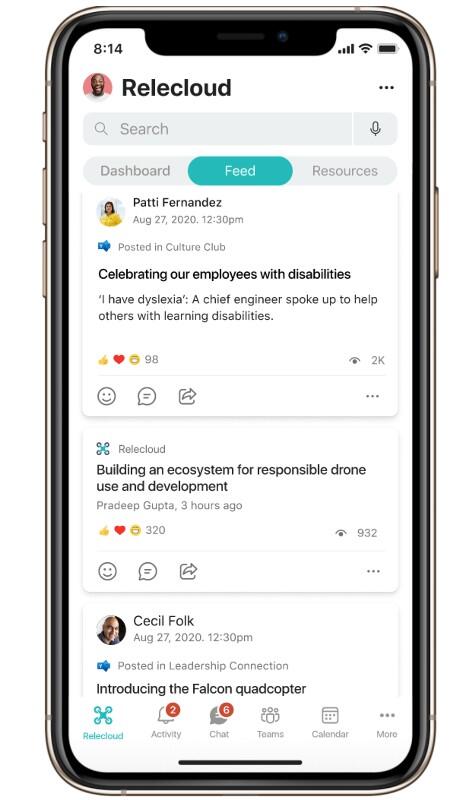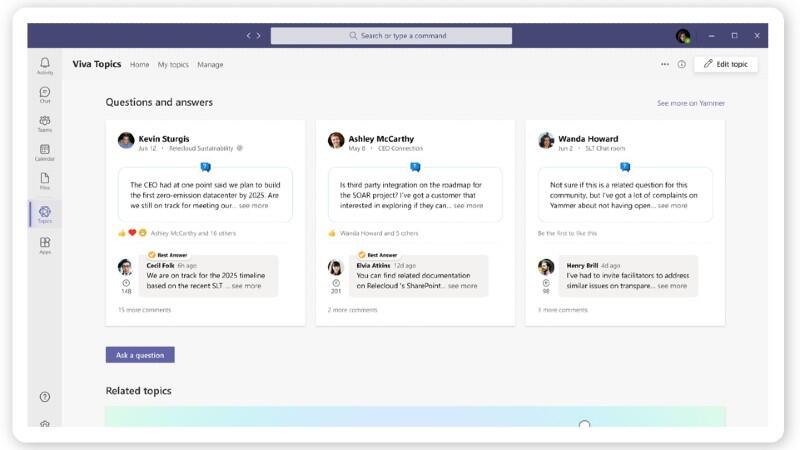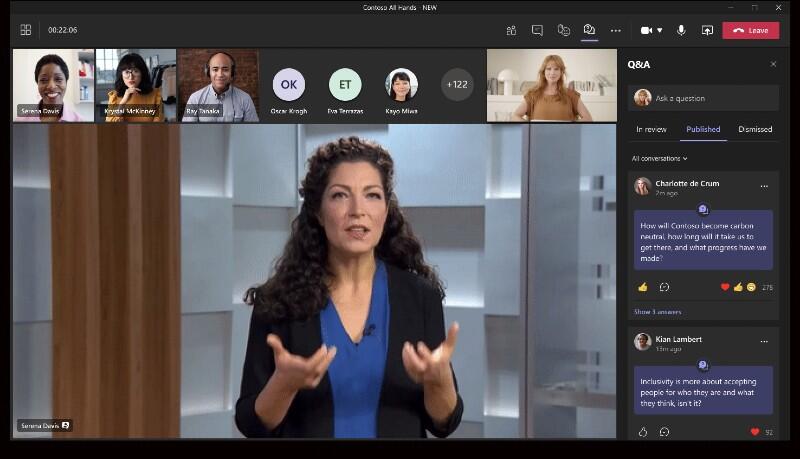Between the Great Resignation and the Great Onboarding, employee experience is more important than ever; Viva is where Microsoft wants to deliver that experience by bringing info from everywhere.

Image: Tada Images/Shutterstock
When Microsoft first launched Teams, there were a lot of questions about why anyone would want both Teams and Yammer. Since then, it's become more obvious that organizations need both the closed and open conversations that the different services foster, and even as Teams usage has shot up during the pandemic, Yammer has more than doubled in the last year as well, said Seth Patton, general manager for next-gen productivity and employee experience in Microsoft 365.
SEE: The future of work: Tools and strategies for the digital workplace (free PDF) (TechRepublic)
"In a world where, right now, we're not all connected in the same place it turns out that the importance of community, the importance of engagement, the importance of engaging between leaders and employees, and employees with each other, is greater than ever."
Yammer inside
Instead of just being a separate enterprise social network, Yammer is now integrated into other Microsoft 365 tools like Teams, Outlook, SharePoint and now Viva, which Patton refers to as the "social fabric" of Microsoft 365. "People are still going to Yammer, but a lot of that is coming through these other endpoints," he noted. "A lot of Yammer usage is people replying and reacting to Yammer conversations directly from Outlook."
You might still go to Yammer directly for an event like a "town hall" meeting where you can ask executives questions, but that's not just about the live meeting, especially when remote employees might be in different time zones and communication needs to be asynchronous. "[It's the] the conversations that lead up to that and conversations that continue after those episodic moments," Patton said. "That's how we run Microsoft. Satya [Nadella, chairman and CEO of Microsoft], every month, has a town hall meeting where employees all month long can submit questions and have on-going conversations and then he addresses what's top-of-mind. Having that experience with conversation and video and live meetings is pretty powerful."
One way you'll find out about relevant conversations that are happening on Yammer is that the communities feature in Viva Connections is now Yammer communities under the hood and uses the connections of the Microsoft Graph to pick out conversations you're likely to be interested in.
SEE: Research: Video conferencing tools and cloud-based solutions dominate digital workspaces; VPN and VDI less popular with SMBs (TechRepublic Premium)
"Viva Connections has a unified communications feed. I think of it as an employee app, so here it's the Microsoft app, where you don't just get announcements and content from your intranet, you also get conversations and those are personalised using the Microsoft Graph. So, I have a unified communications feed as a part of Viva Connections that includes Yammer conversations that are relevant to me from across the organisation," he explained.

The conversations and communities in Viva come from Yammer.
Image: Microsoft
"Connections is a single place for an employee to get access to the resources, the conversations, the content. And an important part of that is conversations that are happening across the organisation and the communities that are participating."
Yammer is also switching to use the same topics taxonomy as Viva Topics (previously, it had its own list). Viva Topics uses the same artificial intelligence features as SharePoint Syntex to create a taxonomy of the projects, products, customers, events, locations, divisions and other common terms that have special meaning for a particular organization from the documents, video and conversations inside your Microsoft 365 tenant. If you work at GM, you mean something different from what someone at NASA would mean when you talk about Saturn and another company might use that as a codename.

Topics in Viva and Yammer now use the same taxonomy and can show the right answer when someone asks a question that's been asked and answered before.
Image: Microsoft
Viva topic cards already pop up when you search in SharePoint, Word, PowerPoint, Outlook and Excel, and now they will be part of conversations in Yammer, so when you see someone refer to an unfamiliar project or a new codename, you can hover over it to see the details scraped from all the content that mentions it on Microsoft 365. Employees still spend the equivalent of two weeks a year just looking for information; Syntex and Topics are intended to help with that, especially when you don't know what you're looking for.
Although creating a formal taxonomy of important information is still valuable, it takes a lot of work that needs to be refreshed regularly. "That is very hard to maintain and have it be agile and dynamic, based on how actual work is happening and the relationships and interactions," Patton pointed out; Viva can create the "folksonomy" of what people are interested in and talking about to capture the implicit knowledge contained in individual documents and conversations and connect that to the formal top-down approach. "How do we still provide some level of structure, but use AI to be able to make that a lot more rich and emblematic of other relationships and the work that's actually happening in our organisation."
Knowing what your own team is working on is critical; but topics and conversations might help you learn from other projects and products elsewhere in the organization. Patton recently discovered that a team in another division of Microsoft was commissioning the same research one of his teams was also getting done. "I'm using the 'dog food' version of topics in Teams and topics in SharePoint and Yammer. To be working on a project, and then discover another project that's happening one org over that's very similar, trying to solve the same problem, and it's like serendipity. That wouldn't have happened even just three months ago."
SEE: Microsoft Power Platform and low code/no code development: Getting the most out of Fusion Teams (TechRepublic)
The combination of the breath of Yammer and the relevancy of topics in Viva lets leaders track what's going on across large groups of employees and long periods of time. "I literally could not live without Yammer because it is the way that I get a pulse on our entire 40,000 field community: feedback on our products, marketing, our competition, what are trends happening in their region, what are the needs that they have. These are people I will never meet in person; there's no way I can scale to that."
That way you can look back at the decisions made when designing a product to see if they connect the problem a customer is having even if the project had a code name or some of the people involved have since left the company.
The Great Onboarding
Teams and Viva Topics have a Q&A feature; for Teams the focus is on getting answers during an event (you may have seen that at Microsoft events like Ignite, and it will be available to customers soon). Viva can retrieve that reply later if someone else has the same question. "When you have a question and initially some expert answers it within Yammer, after that Viva knows the next time someone asks that question that we already have the answer and the expert doesn't need to answer again."

Topics in Viva and Yammer now use the same taxonomy and can show the right answer when someone asks a question that's been asked and answered before.
Image: Microsoft
It's also going to be useful for getting new employees up to speed; something that may be even more important this year. Patton mentions the idea of the Great Resignation. "According to our surveys and others, 40% of people, post pandemic, are looking to change their roles, either within their company or altogether change companies." But although 4 million people quit their jobs in the U.S. in April alone, more than 6 million people were hired that month.
"We're thinking of it as the Great Onboarding, which is the flip side of that. How do we help teams and organisations make that experience a lot better? I have several people on my team who have joined, and they've never met another Microsoft employee, they've never been to a physical office. How do we get them the knowledge that they need, but also the connection and the culture?"
Yammer and Teams are part of that, but Viva is where Microsoft is trying to bring together all the key pieces of the employee experience, from onboarding and staying connected to colleagues in Viva Connections, to staying on top of work with Viva Topics. Even Viva Learning is about connecting what training is available with what would be useful for people to learn to deliver what the organization needs in terms of skills.
SEE: This open-source Microsoft benchmark is a powerful server testing tool (TechRepublic)
"A lot of people initially understand the value that Viva learning has as just aggregation: You have all these different learning content providers and learning management systems and LinkedIn Learning and your own custom content and content in SharePoint and so on. Clearly there's value in just the aggregation of all of those into one experience within Teams. But where the real value comes is applying AI, understanding the context of each person and what roles and what projects there are, so that you're surfacing the most relevant training for them in the context of their role and their job, and based on the social folksonomy of other people in your organisation who have similar roles, who also recently either recommended that training or took that training."
That might even be influenced by the number of support tickets for internal systems that have frequent problems, or on field service and customer support calls recorded in Dynamics 365—which employees can now see information in even if they don't have a licence for it—whatever information employees need to have at their fingertips.
As well as Microsoft modules in Viva, there are integrations with 21 platforms including ServiceNow, Workday, Headspace and Limeade.
That goes back to the idea of Viva as "an employee experience platform." "How do you put people at the centre and create a unified employee experience that includes not just productivity and collaboration tools, but all the other resources and information that they need to be successful? That could be your CRM data, if you're a salesperson, but it can also be things like a health check if I'm going back to the office or it could be my time and expense entry. Or it could be these systems of record, whether that's HR systems or learning systems, that have this valuable knowledge and content, but they're underutilised, and it's a complicated, complex experience for users."
"Employee experience used to be an HR priority: it is now a C-suite imperative. Every organisation realises for them to be competitive, they need to focus on creating a great employee experience or their employees are going to leave," Patton said.
"Tools for helping connect people and create culture and knowledge sharing are exploding. Yammer is a core part of that and a part of our strategy, both in terms of the role that it plays, and the growth that it's had in the last year but also where we're taking it—as that integrated social fabric across Microsoft 365 and communities powering Viva."

Microsoft Weekly Newsletter
Be your company's Microsoft insider by reading these Windows and Office tips, tricks, and cheat sheets. Delivered Mondays and Wednesdays
Sign up todayAlso see
- How to make fewer mistakes and work more efficiently using predictive text in Microsoft 365 (TechRepublic)
- How to use the many text wrapping options in Microsoft Word (TechRepublic)
- How to become a software engineer: A cheat sheet (TechRepublic)
- 5 programming languages application solutions developers should learn (free PDF) (TechRepublic)
- The best programming languages to learn--and the worst (TechRepublic Premium)
- Must-read coverage: Programming languages and developer career resources (TechRepublic on Flipboard)







 English (US) ·
English (US) ·